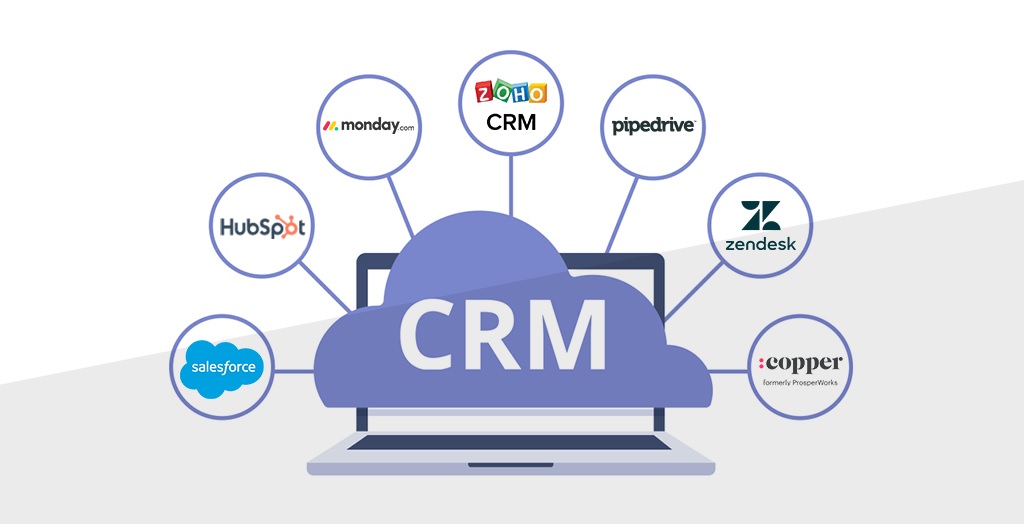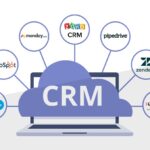In the dynamic landscape of modern business, where customer relationships are paramount, the adoption of Customer Relationship Management (CRM) software has become pivotal. This technology transcends conventional approaches, offering businesses a systematic means to manage, understand, and elevate their interactions with customers. In this exploration, we unravel the intricacies of CRM software, from its fundamental functionalities to the critical task of choosing the right solution. Real-world success stories and a glimpse into future trends underscore the transformative power of CRM, positioning it as a strategic asset for businesses aiming not just to survive but to thrive in an increasingly customer-centric era.
Understanding CRM Software
Customer Relationship Management (CRM) software is a powerful tool that helps businesses build and maintain strong relationships with their customers. In simple terms, it’s like a digital hub where all customer-related information is stored, organized, and easily accessible. Let’s delve into the key aspects of understanding CRM software:
Core Functionalities of CRM:
- Contact Management:
CRM keeps all your customer contacts in one place.
Easily access details like names, emails, and phone numbers.
No more digging through spreadsheets or notebooks.
- Lead Tracking:
Track potential customers or leads through the sales pipeline.
Monitor their interactions with your business.
Helps in understanding where each lead stands in the conversion process.
- Sales Automation:
Automate repetitive sales tasks.
Set reminders for follow-ups and appointments.
Improves efficiency, allowing your team to focus on building relationships.
- Customer Communication:
Centralized platform for communication.
Record of emails, calls, and meetings in one place.
Ensures a consistent and personalized customer experience.
- Analytics and Reporting:
Gain insights into customer behavior and preferences.
Track sales performance and marketing efforts.
Make informed decisions based on real data.
Types of CRM Software:
- Operational CRM:
Focuses on day-to-day business operations.
Manages customer interactions in areas like sales, marketing, and service.
- Analytical CRM:
Analyzes customer data for business insights.
Helps in strategic decision-making based on customer trends.
- Collaborative CRM:
Enhances communication and collaboration between different teams.
Ensures everyone in the organization is on the same page regarding customer interactions.
Benefits of Using CRM Software
Customer Relationship Management (CRM) software isn’t just a fancy tech solution; it’s a game-changer for businesses seeking to foster lasting connections with their customers. Let’s explore the tangible benefits that come with incorporating CRM software into your business operations:
- Improved Customer Relationships:
Centralized Customer Data: All customer information in one place, making it easy to understand preferences and history.
Personalized Interactions: Tailor your communication based on customer behavior and preferences.
Timely Follow-ups: Set reminders for follow-ups, ensuring you stay engaged with your customers. - Increased Sales and Revenue:
Lead Prioritization: Identify and focus on high-potential leads, increasing conversion rates.
Sales Automation: Streamline repetitive tasks, allowing your sales team to concentrate on closing deals.
Sales Forecasting: Accurately predict sales trends and identify areas for improvement. - Enhanced Marketing Strategies:
Targeted Marketing Campaigns: Leverage customer data for precise targeting in marketing efforts.
Campaign Effectiveness: Track and analyze the success of marketing campaigns in real-time.
Customer Segmentation: Divide your customer base for more effective and personalized marketing. - Streamlined Business Processes:
Efficient Data Management: Eliminate manual data entry and reduce the risk of errors.
Automated Workflows: Create workflows for seamless coordination between different departments.
Time Savings: Free up time by automating routine tasks, allowing your team to focus on strategic initiatives. - Data-Driven Decision-Making:
Real-Time Analytics: Access up-to-date analytics to make informed decisions.
Performance Tracking: Evaluate the success of various strategies and adjust as needed.
Business Intelligence: Gain valuable insights into customer behavior and market trends.
How to Choose the Right CRM Software
Selecting the right Customer Relationship Management (CRM) software is a critical decision that can significantly impact the efficiency and success of your business. Here’s a straightforward guide on how to choose the CRM software that aligns with your specific needs:
- Assess Your Business Needs:
Identify Goals: Clearly define your objectives for implementing CRM (e.g., improving customer relationships, boosting sales, streamlining processes).
Understand Workflows: Analyze your current business processes to pinpoint areas that need improvement. - Scalability and Customization:
Consider Growth: Choose a CRM solution that can grow with your business. Scalability is key for long-term success.
Customization Options: Ensure the CRM software can be tailored to fit your unique business requirements. - User-Friendly Interface:
Ease of Use: Opt for a CRM system with an intuitive interface that your team can quickly adapt to.
Training Resources: Check if the software provider offers training resources and support for a smooth onboarding process. - Integration Capabilities:
Compatibility: Ensure the CRM integrates seamlessly with your existing tools (e.g., email, marketing, accounting software).
API Access: Look for a CRM solution with open APIs for future integrations. - Customer Support and Training:
Responsive Support: Choose a vendor with reliable customer support to address issues promptly.
Training Options: Opt for a CRM provider that offers training sessions to maximize user proficiency. - Security Measures:
Data Encryption: Prioritize CRM solutions with robust data encryption to safeguard sensitive customer information.
Compliance: Ensure the software complies with industry standards and regulations. - Cost Considerations:
Transparent Pricing: Look for CRM providers with clear and transparent pricing structures.
Scalability Pricing: Check how pricing scales as your business grows. - User Feedback and Reviews:
Research Reviews: Read customer reviews and testimonials to understand the experiences of other businesses.
Request Demos: Ask for product demonstrations to see the CRM in action. - Mobile Accessibility:
Mobile Compatibility: Ensure the CRM software is accessible and functional on mobile devices.
App Availability: Check if the CRM has dedicated mobile apps for convenient on-the-go access.
Top CRM Software Solutions in 2024
As we step into 2024, the landscape of Customer Relationship Management (CRM) software continues to evolve, offering businesses advanced tools to enhance customer interactions and streamline operations. Here are some of the top CRM software solutions making waves this year:
- Salesforce:
Overview: A powerhouse in the CRM world, Salesforce offers a comprehensive suite of tools for sales, marketing, and customer service.
Key Features:
Advanced analytics for data-driven decision-making.
Robust customization options to tailor the CRM to your business needs. - HubSpot CRM:
Overview: Known for its user-friendly interface, HubSpot CRM is a favorite among small and medium-sized businesses.
Key Features:
Seamless integration with HubSpot’s marketing and sales tools.
Free version available with essential CRM features. - Zoho CRM:
Overview: Zoho CRM is a versatile solution suitable for businesses of all sizes, offering a range of features to streamline customer interactions.
Key Features:
AI-powered sales assistant for smarter decision-making.
Integration with various third-party apps for enhanced functionality. - Microsoft Dynamics 365:
Overview: Integrated with Microsoft’s suite of business tools, Dynamics 365 provides a unified platform for sales, customer service, and operations.
Key Features:
AI-driven insights for personalized customer interactions.
Scalability to accommodate the growth of your business. - Insightly:
Overview: Ideal for small businesses, Insightly offers a user-friendly CRM solution with project management capabilities.
Key Features:
Integration with popular productivity tools like G Suite and Office 365.
Project management features to enhance collaboration.
Implementing CRM Software Successfully
Implementing Customer Relationship Management (CRM) software is a strategic move that can revolutionize the way your business interacts with customers. To ensure a smooth and successful implementation, follow these key steps:
- Planning the Implementation Process:
Define Objectives: Clearly outline what you aim to achieve with CRM. Whether it’s improving customer relationships or streamlining sales processes, having clear goals is essential.
Create a Roadmap: Develop a step-by-step plan for implementation, including timelines and milestones. - Employee Training and Onboarding:
Educate Your Team: Provide comprehensive training to your team on how to use the CRM software effectively.
Hands-On Practice: Encourage hands-on practice and address any concerns or questions during training sessions.
Designate Experts: Identify superusers within your team who can assist others during the onboarding process. - Monitoring and Evaluating CRM Performance:
Set Key Performance Indicators (KPIs): Define metrics that align with your business goals, such as increased sales, improved customer satisfaction, or streamlined processes.
Regularly Evaluate Progress: Continuously monitor and evaluate how well the CRM is meeting your objectives.
Gather Feedback: Encourage feedback from users to identify areas for improvement. - Addressing Challenges and Optimizing Usage:
Proactively Address Issues: Be proactive in addressing any challenges or roadblocks that arise during implementation.
Optimization Strategies: Regularly review and optimize your CRM processes based on user feedback and changing business needs.
Provide Ongoing Support: Maintain a support system to assist users with any ongoing questions or issues. - Integration with Existing Systems:
Ensure Compatibility: Ensure that the CRM seamlessly integrates with your existing tools and software.
Data Migration: Plan and execute a smooth data migration process to transfer relevant information to the new CRM system. - Data Security and Compliance:
Implement Security Measures: Prioritize data security by implementing encryption and access controls.
Ensure Compliance: Confirm that your CRM solution complies with relevant data protection regulations. - Celebrate Successes and Recognize Achievements:
Acknowledge Achievements: Celebrate milestones and achievements throughout the implementation process.
Recognize User Contributions: Acknowledge and appreciate the efforts of your team in adapting to and utilizing the CRM effectively.
Case Studies: Real-World Success Stories
Let’s delve into real-world examples of businesses that have harnessed the power of Customer Relationship Management (CRM) software to achieve remarkable success:
- XYZ Corp: Boosting Sales with Salesforce:
Challenge: XYZ Corp, a mid-sized manufacturing company, struggled with disorganized customer data and missed sales opportunities.
Solution: Implemented Salesforce CRM to centralize customer information, streamline sales processes, and automate follow-ups.
Results: Saw a 20% increase in sales within the first year. Improved customer satisfaction and enhanced collaboration among sales teams. - ABC Retail: Enhancing Customer Engagement with HubSpot CRM:
Challenge: ABC Retail, an e-commerce business, faced challenges in maintaining personalized customer interactions and tracking marketing campaigns effectively.
Solution: Adopted HubSpot CRM to consolidate customer data and integrate marketing efforts seamlessly.
Results: Achieved a 15% increase in customer engagement. Saw a 25% improvement in targeted marketing campaign success. - LMN Services: Streamlining Operations with Zoho CRM:
Challenge: LMN Services, a service-based company, grappled with inefficient processes and scattered customer information.
Solution: Implemented Zoho CRM to streamline operations, improve communication, and automate service workflows.
Results: Reduced response time by 30%. Achieved a 40% increase in operational efficiency. - DEF Tech: Unifying Business Processes with Microsoft Dynamics 365:
Challenge: DEF Tech, a technology firm, faced challenges in integrating various business processes and managing customer interactions seamlessly.
Solution: Integrated Microsoft Dynamics 365 to unify sales, marketing, and customer service processes on a single platform.
Results: Streamlined internal communication, leading to a 25% reduction in project delivery time. Improved customer satisfaction scores. - PQR Consultancy: Growing Client Base with Insightly:
Challenge: PQR Consultancy, a consulting firm, needed a solution to manage client relationships effectively and expand its client base.
Solution: Implemented Insightly CRM for project management and client relationship tracking.
Results: Experienced a 30% growth in the client base. Achieved better project coordination and collaboration.
Future Trends in CRM Software
As technology advances, the future of Customer Relationship Management (CRM) software promises exciting developments that will further enhance the way businesses connect with their customers. Here are some key trends to watch for:
- AI and Machine Learning Integration:
What to Expect: Increased integration of Artificial Intelligence (AI) and Machine Learning (ML) algorithms within CRM systems.
Why It Matters: Predictive analytics for customer behavior, personalized recommendations, and automated decision-making processes. - Mobile CRM Advancements:
What to Expect: Continual improvements in mobile CRM functionality.
Why It Matters: Enhanced accessibility, allowing teams to manage customer relationships on-the-go, fostering flexibility and responsiveness. - Enhanced Security Features:
What to Expect: Advanced security measures to protect sensitive customer data.
Why It Matters: With an increasing focus on data privacy, CRM software will prioritize robust encryption, authentication, and compliance with regulatory standards. - Voice-Activated CRM Interfaces:
What to Expect: Integration of voice-activated features for hands-free CRM navigation.
Why It Matters: Streamlining user interactions and making CRM systems more accessible through voice commands. - Greater Integration with IoT:
What to Expect: Deeper integration with the Internet of Things (IoT) devices for real-time data collection.
Why It Matters: Improved insights into customer behaviors, preferences, and product usage patterns. - Focus on Customer Experience (CX):
What to Expect: CRM systems placing a stronger emphasis on enhancing the overall customer experience.
Why It Matters: Businesses will prioritize tools that not only manage customer data but also contribute to creating positive and seamless customer interactions. - Unified Customer Data Platforms:
What to Expect: Integration of various data sources into a unified customer data platform.
Why It Matters: Comprehensive customer profiles, providing a holistic view of customer interactions across different channels. - Increased Automation of Routine Tasks:
What to Expect: Continued automation of repetitive tasks, freeing up more time for strategic activities.
Why It Matters: Improved efficiency and productivity as manual processes are minimized. - Augmented Reality (AR) in Customer Engagement:
What to Expect: Exploration of AR applications for enhanced customer engagement.
Why It Matters: Augmented reality can be leveraged to provide immersive product experiences and interactive customer support. - Blockchain for Data Security:

As businesses continue to evolve, CRM software will play a crucial role in adapting to and driving these emerging trends. Staying abreast of these developments will be key for businesses looking to maintain a competitive edge in the dynamic world of customer relationship management.











